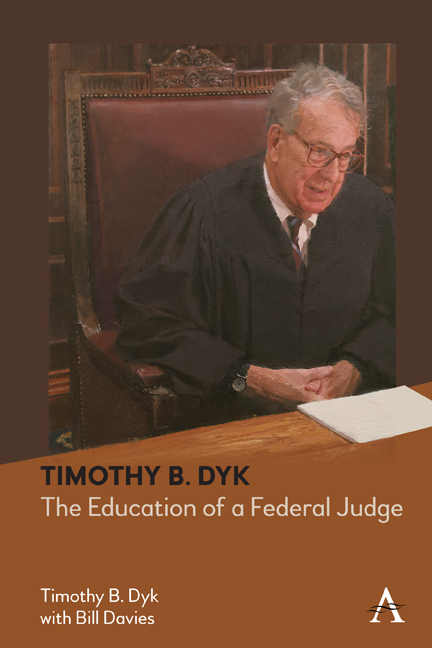Book contents
- Frontmatter
- Dedtication
- Contents
- Foreword
- Acknowledgments
- 1 Introduction
- 2 Family History
- 3 Early Life and Schooling, 1937–61
- 4 Clerking at the Supreme Court, 1961–63
- 5 The Tax Division, 1963–64
- 6 Wilmer Cutler, 1964–90
- 7 Jones Day, 1990–2000
- 8 Reflections on Changes in the Legal Profession
- 9 Becoming a Federal Judge, 1993–2000
- 10 The Confirmation Process, 1998–2000: Selected Diary Entries
- 11 Life as a Federal Judge, 2000–the Present
- 12 Epilogue
- Appendix
- Index
2 - Family History
Published online by Cambridge University Press: 15 September 2022
- Frontmatter
- Dedtication
- Contents
- Foreword
- Acknowledgments
- 1 Introduction
- 2 Family History
- 3 Early Life and Schooling, 1937–61
- 4 Clerking at the Supreme Court, 1961–63
- 5 The Tax Division, 1963–64
- 6 Wilmer Cutler, 1964–90
- 7 Jones Day, 1990–2000
- 8 Reflections on Changes in the Legal Profession
- 9 Becoming a Federal Judge, 1993–2000
- 10 The Confirmation Process, 1998–2000: Selected Diary Entries
- 11 Life as a Federal Judge, 2000–the Present
- 12 Epilogue
- Appendix
- Index
Summary
I begin with a bit of family history on the theory that who you are is influenced by where you came from. My mother, Ruth Belcher, and father, Walter Dyk, came from different backgrounds. My father was an immigrant from Germany, arriving in this country at age 5. My mother came from New England. While I know a great deal about the ancestry of my mother, I know much less about her life. In the case of my father, I know almost nothing about his family history beyond his parents, but I know quite a bit about his life. My mother's family in this country can be traced back to Myles Standish and Priscilla Alden. Of course, they did not marry (Priscilla had famously asked “Why don't you speak for yourself, John?” when John Alden was courting her on behalf of Standish, and she married Alden), but their children married, and they were my ancestors. So I had always felt a strong connection to our country's history.
My mother was born in Portland, Maine, on March 25, 1901, into a family of Republicans. Her father was a lawyer. His name was Arthur Belcher, and he was born in Farmington, Maine, on April 24, 1861, about the time that the Civil War began. He went to Andover and then Bowdoin College. He did not attend law school, but instead studied in various law offices, as was common in those days. Admitted to the bar in 1885, he practiced law in Farmington until 1896, when he moved to Portland and entered into a partnership with Frederick Hale. A lot of the work he did as a lawyer was for a telephone company. Unhappily, at a time when he reportedly was about to run for the US Senate, my grandfather contracted appendicitis and died of peritonitis on October 5, 1904, when my mother was just three years old. My grandfather's partner, Hale, was elected to the US Senate in 1916 and became famous for his opposition to Hugo Black's nomination to the Supreme Court because of Black's Klan affiliation, an opposition that was misplaced, given Justice Black's later record.
- Type
- Chapter
- Information
- Timothy B. DykThe Education of a Federal Judge, pp. 7 - 14Publisher: Anthem PressPrint publication year: 2022



